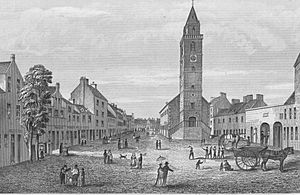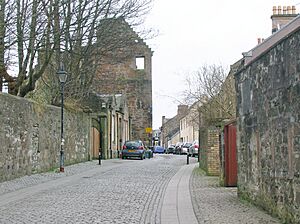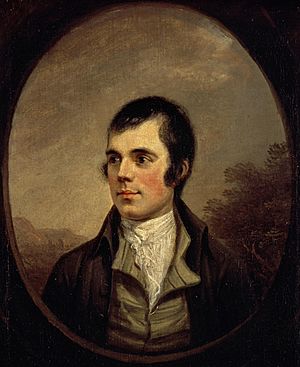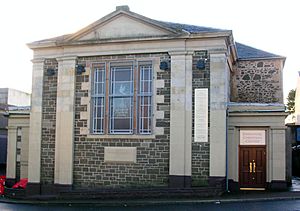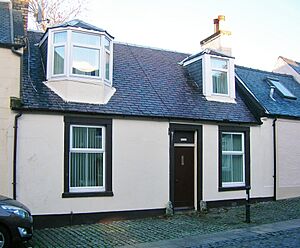Jean Gardner facts for kids
Quick facts for kids
Jean Gardner
|
|
|---|---|
| Born | September 1746 Irvine, Ayrshire, Scotland
|
| Died | Circa 1793 Philadelphia, USA
|
| Occupation | Housewife |
Jean Gardner was known for her great beauty. She was also called Jean Hill later in her life. She lived in Irvine, Scotland, and is remembered for her connection to the famous Scottish poet, Robert Burns. Some people believe they were good friends, or even more.
However, there isn't much clear proof from that time about their relationship. Robert Burns himself didn't write much about her. Some think he might have mentioned her as 'darling Jean' in one of his poems, but most experts believe he was talking about Jean Armour.
Contents
Jean's Early Life and Family
Jean Gardner was likely the daughter of James Gardiner, who was a butcher in Irvine. Her mother was Janet Caldwell. Jean was born in September 1746. Her family lived in a part of Irvine called Seagate. Her father owned several houses there.
When Jean's father passed away in 1768, she inherited some of his property. It's thought that she might have been a widow by then, having been married to a shipmaster named Alexander Armour. This would mean her married name was also 'Jean Armour', which can be a bit confusing!
Joining the Buchanites
Jean Gardner's family home in Seagate was once a lodging place for a preacher named Hugh White. He was a minister who had left the main church. After one of his sermons, a woman named Elspeth Buchan followed him back to Irvine. She then started a very strict religious group called the Buchanites.
Jean Gardner decided to join this group. The Buchanites were a small group, with only about 46 members. They were asked to leave Irvine in May 1784 because of their unusual beliefs. Jean eventually joined them in a barn at New Cample in Dumfrieshire. Some people think she was slow to leave Irvine because she didn't want to leave Robert Burns.
Life in America
While with the Buchanites at New Cample, Jean met George Hill. He was also a member of the group. After the Buchanites group broke up, Jean and George got married. They then moved to America. Jean is believed to have passed away in Philadelphia around 1793 from a fever.
Jean's sister, Kate, also joined the Buchanites. Kate had a child with another member, Andrew Inness. However, the rules of the group didn't allow them to marry. Kate stayed with Andrew until she died, and he became the very last member of the Buchanite group.
Who Was George Hill?
George Hill was the first person to join the Buchanites when they were at New Cample. He was a smart and well-educated man. Before joining the group, he worked as a clerk at the Closeburn Lime Works.
When his family in Edinburgh found out he was planning to leave his job to become a Buchanite, two of his brothers traveled to try and convince him not to. They worried it would ruin his life and bring shame to the family.
Jean Gardner and Robert Burns
There are stories that connect Jean Gardner with Robert Burns. A member of the Buchanites, Andrew Innes, once said that Jean was worried about Burns seeing her when she was traveling. He said she felt "discomposed" because they "had been on terms of intimacy." In the 18th century, "intimate" could just mean "good friends."
Burns's sister, Mrs. Begg, also said that the poet was fond of Jean Gardner for a while. Some accounts suggest that Burns visited Jean at the Buchanite settlements. It's even been said that Jean tried to convince Burns to join the Buchanites himself!
There's a story that Robert Burns rode to New Cample to try and convince Jean to leave the group. He supposedly spent a whole day and night trying to get her to come back. However, this might be an exaggerated story based on what Andrew Innes said many years later.
Robert Burns himself didn't think highly of the Buchanites. He wrote about them, saying they had "fanatical notions of religion." He mentioned that the townspeople of Irvine eventually forced the leader, Mrs. Buchan, out of town. He described the group's beliefs as "strange jumble of enthusiastic jargon." Burns felt they were ignoring "sound reason" and "common sense" in their religious practices.
See also
- Jean Armour
- Lesley Baillie
- Alison Begbie
- Nelly Blair
- May Cameron
- Mary Campbell (Highland Mary)
- Jenny Clow
- Jean Glover
- Helen Hyslop
- Kate Kemp
- Nelly Kilpatrick
- Jessie Lewars
- Elizabeth Paton
- David Sillar
- Isabella Steven
- Peggy Thompson


